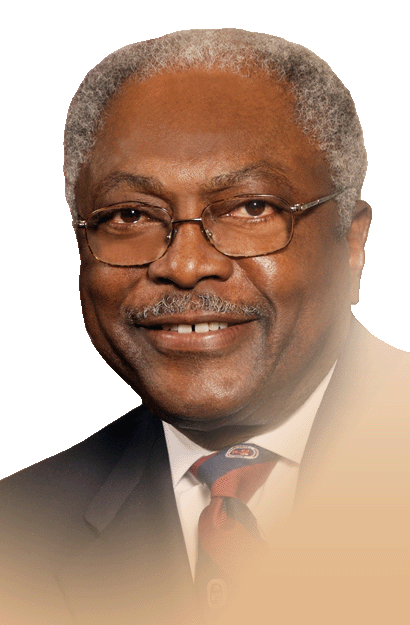 |
 |
 |
 |


| ||||||
|
On November 16th, 2006, the House Democratic Caucus unanimously elected Congressman James E. Clyburn of South Carolina Majority Whip for the 110th Congress. This was a historic day for House Democrats, having just won back the majority for the first time in twelve years. It was also historic for Jim Clyburn, who became the first South Carolinian and the second African American to ascend to the third ranking position in the U.S. House of Representatives. In accepting his new role, Congressman Clyburn shared with his colleagues a story from his childhood that told much about the environment from which he came and about the man he has become. When he was about 12 or 13 years old, he stopped by his mother’s beauty shop after school in his hometown of Sumter, South Carolina. A client of his mother’s asked young James what he wanted to be when he grew up. James responded by expressing his dreams of wanting to be in politics and government. He was quickly rebuked by the woman, who admonished him never to utter those words again. She was not intending to throw cold water on young James’ dreams. She genuinely felt that such expressions could bring danger to him and his family in the segregated South. That night, his mother told young James to ignore the client’s warning and encouraged him to hold fast to his dreams. It took a long road and 66 years for him to reach the pinnacle of those dreams. His humble beginnings as the eldest son of an activist fundamentalist minister and an independent civic minded beautician grounded him securely in family, faith and public service. He later graduated from Mather Academy in Camden, South Carolina, and became a student leader at South Carolina State College in Orangeburg. Growing up knowing many of the families involved in the desegregation case Briggs v. Elliott -- which later became part of the landmark Brown v. Board of Education case -- Clyburn was active in the civil rights movement. He was elected president of his NAACP youth chapter when he was 12 years old, participated in many marches and demonstrations, and was chosen as the star witness in an Orangeburg civil disobedience case defended by the legendary Matthew Perry. That case developed from the arrest of 388 college students -- two of whom were Jim and Emily England of Moncks Corner, South Carolina, whom he met during that incarceration. He was later jailed during the march on the South Carolina State Capitol in Columbia that resulted in the landmark breach of the peace case Edwards v South Carolina. Jim and Emily have been married since June 24, 1961. They began their personal and professional lives together in Charleston, South Carolina, he as a history teacher and she as a librarian in the public school system. Jim later served as an employment counselor, and director of two youth and community development programs. In 1968, he became director of a migrant and seasonal farm workers program. The Clyburns are staunch supporters of their Alma Mater and have raised over $1.5 million for an Archives and History Endowment they have established at the school. South Carolina State University has named campus facilities in their honor. Sixteen other colleges and universities have awarded Jim honorary degrees. Jim launched the pursuit of his dream in 1970 running for the South Carolina House of Representatives. He went to bed a 500-vote winner, and awoke a 500-vote loser. His pragmatic reaction as reported in the local newspaper, "I lost because I didn’t get enough votes," caught the eye of the newly elected governor, John Carl West. He asked James, whom he dubbed "Jim," to join his administration. In accepting the post, James E. Clyburn became the first African American advisor to a South Carolina governor since post Reconstruction. After almost four years on his staff, Governor West appointed Jim South Carolina Human Affairs Commissioner. It was a position he would hold for almost 18 years serving four Governors -- two Democrats and two Republicans. The position thrust Jim into the vortex of a number of controversies, which he handled deftly quickly earning him a reputation as a fair and firm mediator and consensus builder. But when he ran for South Carolina Secretary of State in 1978 and again in 1986, his lifelong dream continued to elude him. But in 1992, Jim resigned his position as Human Affairs Commissioner to devote fulltime in pursuit of his lifelong dream of serving in the United States Congress -- where no black South Carolinian had served since 1897. This time, in a field of five Democratic primary candidates, Clyburn won with 56% of the vote, avoiding a run-off. He easily won the general election for South Carolina’s Sixth Congressional District, and was sworn in as a member of the United States House of Representatives in January 1993. Congressman Clyburn began his steady climb on Capitol Hill winning election as co-President of his freshman class. Six years later, he was unanimously elected Chair of the Congressional Black Caucus and to a seat on the coveted Appropriations Committee. In 2002, he was elected in a three-way race to serve as Vice Chair of the House Democratic Caucus, and in January 2006, his peers unanimously elevated him to Chair of the Caucus. In addition to serving as House Majority Whip, Congressman Clyburn serves as leader of the House Democrat’s Faith Working Group. The Clyburns have three daughters, Mignon, Angela and Jennifer Clyburn Reed, a son-in-law, Walter Reed; and two grandchildren, Walter A Clyburn Reed and Sydney Alexis Reed. |